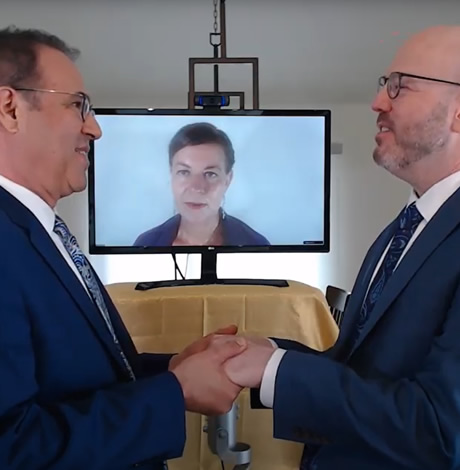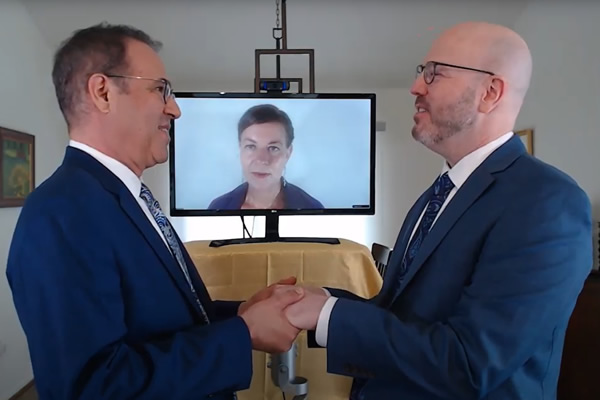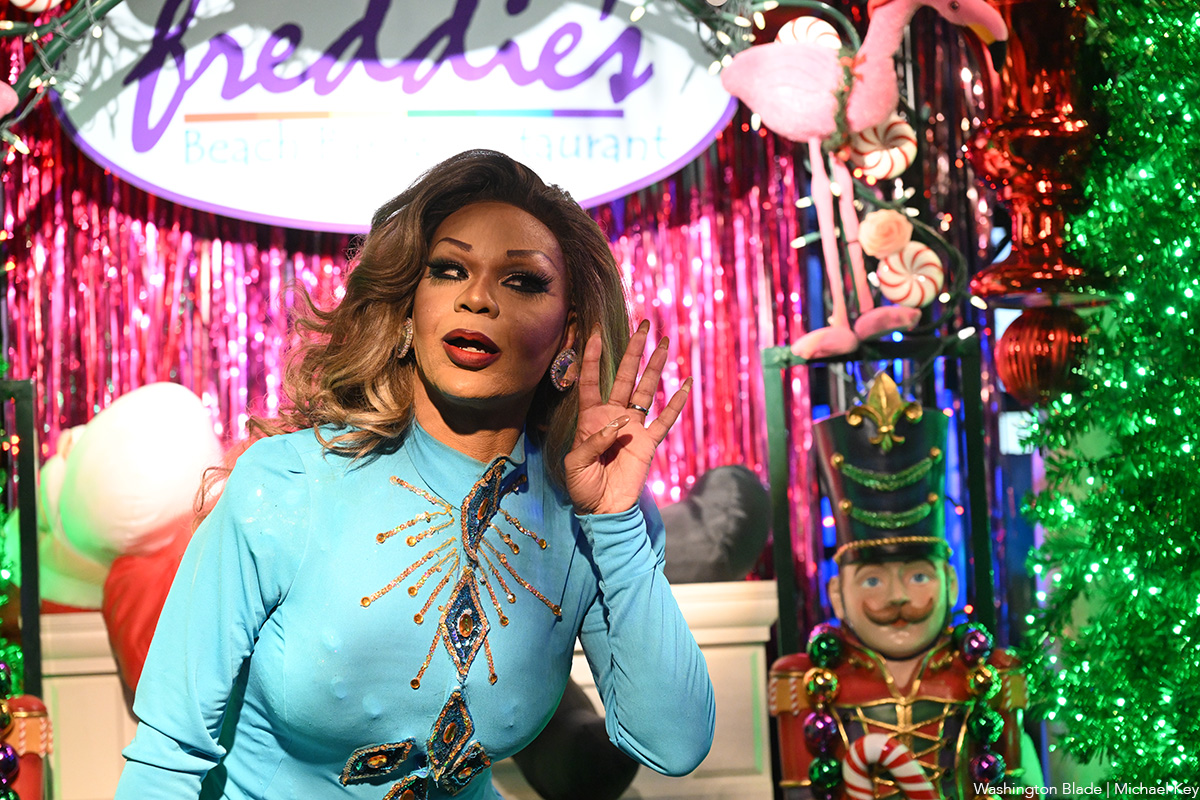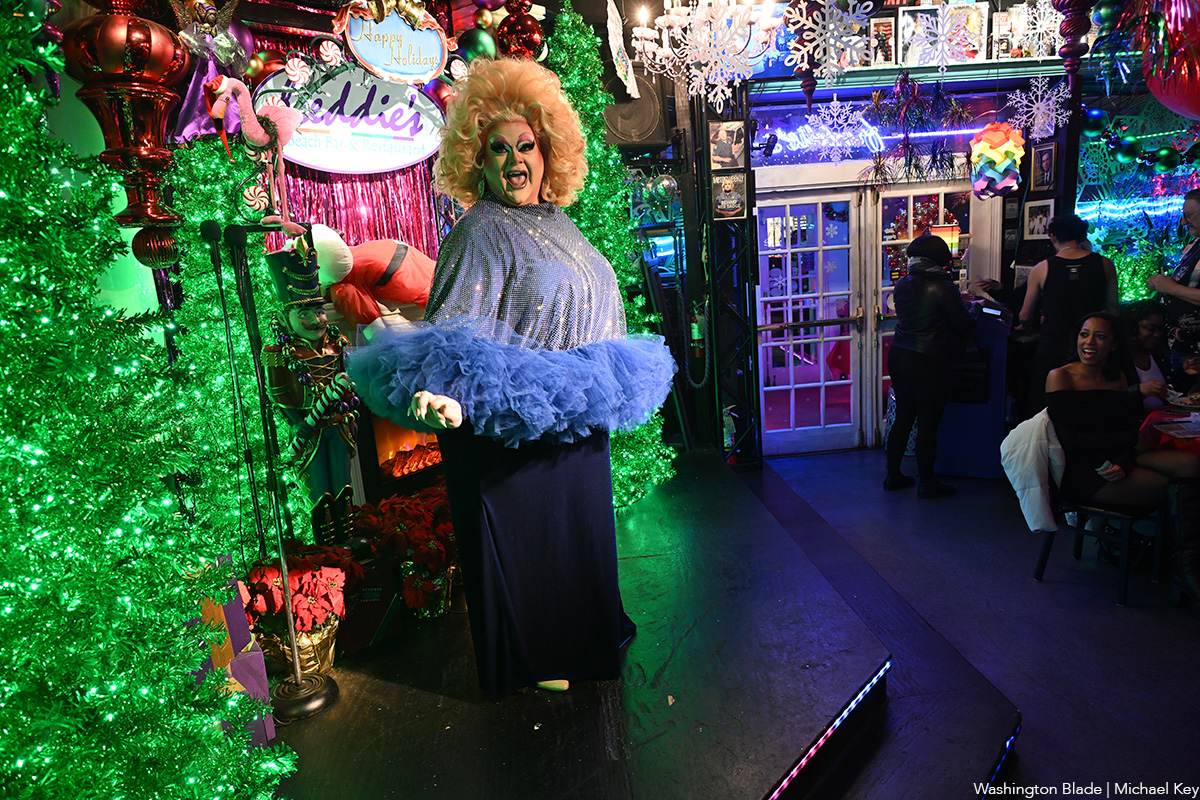Arts & Entertainment
Local gay couple proceeds with wedding plans despite lockdown
Family and friends gather virtually to celebrate same-sex nuptials


When Harry met Brian in 2015, the U.S. Supreme Court had just legalized same-sex marriage in all 50 states. Five years later around their kitchen table they agreed they were going to be damned if a pandemic stopped them from exercising that right.
“I played a lot of weddings,” says D. Brian Lee, a 58-year-old musician and definitely the feistier of the two, having been out since he was a teen. “I felt so down on the institution because it was never going to be me, but now we’ve won.”
“It was most important to us for people to honor and witness our wedding,” says Harry Fox, a 62-year-old health care administrator who had been married previously to a woman for 20 years. He had to overcome his own internalized homophobia to find strength and happiness.
On Saturday, April 25 Lee and Fox held their wedding virtually and became one of many couples around the world who didn’t let COVID-19-induced stay-at-home orders lockdown their love.
Internationally, the Singapore parliament is even considering a bill to further legalize virtual marriages during the crisis, according to The Straits Times.
In the U.S., virtual weddings via YouTube, Zoom and other conferencing platforms are becoming so prevalent that The Wedding Spot blog gives a detailed how-to for planning one.
NPR also reports New York Gov. Andrew Cuomo (D) signed an executive order on April 18 that allows clerks to perform wedding ceremonies via video conferencing platforms and for couples to get their marriage licenses remotely. And a quick Twitter search of the #ZoomWedding hashtag will find other creative couples taking advantage of similar marriage expansions in their areas.
Aaron Tax of SAGE, an LGBTQ senior advocacy organization, is not surprised that many choose the legal protections of marriage during a health crisis.
“Marriage may provide psychological benefits and more tangible benefits like economic security and certain legal rights to couples,” he says. “There really is no shorthand for saying ‘my wife’ or ‘my husband’ when an emergency arises and you want to explain the nature of your relationship.”
Fox agrees. When he was separated from his wife and had begun dating Lee, she became stricken with cancer. He admitted when he went to the hospital with their son, now 23, to visit her there was a certain legitimacy and “straight privilege” that made things easier for them during a difficult time.
“I think there’s a tremendous difference in the eyes of the world between a married couple and those who are living together,” Fox says. “And it plays out in the hospital room. There are significant rights in this culture that marriage confers and (Brian and I) want to be there for each other without anyone questioning that we have a right to be there.”
Lee also remembers seeing “unmarried partners being locked out of hospital rooms” of dying loved ones during the height of the HIV/AIDS crisis in the 1980s. He recalled this as a dark time filled with “some very inhumane treatment,” and this moved him to respect the institution of marriage.
That’s why he insisted that Fox divorce his wife before moving in with him.
“That was a trying and difficult time,” Fox says. “It was important for me to help my wife, but Brian was clear that I needed to be divorced before we moved in together.”
Fox’s wife eventually died, though she did get a chance to meet Lee before she died. The two of them had a quiet conversation while Fox made dinner in the other room. Later they moved together into the rented house they enjoy now in Potomac, Md., and their traditions of kitchen table conversations began.
“We meet every morning and every evening at this table to talk,” Fox says. “When you think about being with someone for the rest of your life, if it’s not fun to talk to the other person, you shouldn’t be with them.”
Lee was more impassioned in his agreement.
“I don’t want to have to pry the book open with a partner,” he says. “But with Harry, it’s very easy.”
However, it wasn’t so easy in the beginning as Fox was still struggling with his sexuality. Unlike Lee, he came out in his 50s and there were a few conditioned beliefs he had to lay to rest.
“In the beginning of our relationship, there was my own internalized homophobia,” Fox says. Sure, he had been married before, but that was in a traditional Jewish ceremony. “Did I see myself married to another man? Do I see myself kissing another man in public?”
As a musician, Lee calls Fox’s anxieties a form of “stage fright” which he still sees in his partner time and again.
“There have been times when I feel that if Harry is feeling a little anxious about something, I’ll say, ‘Ah, he’ll get through it.’ It just takes time and talking.”
And talking is something they’ve done plenty of over the years. As the two of them continued to date and their bond grew, Fox came out to more family and friends.
“But I felt I needed to come out at work,” he says. “Since work was such a large part of my life, in order to feel like an integrated human being and to get rid of the internal compartments I had maintained throughout my adult life.”
This was a difficult decision for him since at the time Fox was the chief information officer for a large health care insurance provider and responsible for over 2,500 employees. And from a legal standpoint, the U.S. Supreme Court is still weighing whether or not it is unconstitutional for employers to fire workers based on sexual orientation or gender identity.
Still, he knew then that he wanted Lee to be a part of his life. All of it.
“After I came out at work, I took Brian as my date to a dinner event with work colleagues,” Fox says, still sounding a little surprised that everything worked out so well. “I was also invited to join the board of Whitman-Walker Health.”
Fox says coming out fully swept away a lot of his remaining internalized homophobia and became a “very powerful life-changing experience.”
Fox and Lee felt their shared experiences together strengthened their resolve to get married, not just as an act of social justice but because they loved one another and were growing together. Then COVID-19 hit.
It was time for another discussion around the kitchen table.
“We talked about cancelling the physical wedding, but it took such a long road to get here,” Fox says. “In the real world the restrictions will ease up slowly, and there probably wouldn’t be another time to get people to fly in until later next year.”
Both he and Lee had already lost older family members and feared more wouldn’t last long enough to see them married. Lee added that when you hit your middle years, you just don’t know how much time older family members have left. Finally, they decided, “there will never be a perfect time … let’s just do it.”
“And I know people in our social circles love our parties,” Lee says. “And this was going to be the ultimate party.”
Fox and Lee have IT backgrounds and were familiar with the technology needed to pull off a virtual wedding. They decided to live-stream the ceremony on YouTube and hold the virtual receiving line via Zoom while sending out wedding cupcakes to family and friends.
“We did a butt-load of tests,” Lee says. “We had a dry run to make sure everyone could connect and with sound. I set up YouTube lives before at my other job. I still kept praying the internet keeps working.”
They had gotten their marriage license prior to the pandemic and its social distancing restrictions and business closures. They looked into Maryland marriage laws and found a confusing passage they reasoned meant the officiant needed to be physically “in the county in which” the marriage license is issued.
So their officiant, Hanna Nielsen-Jones, arranged for another officiant to marry them an hour before their virtual wedding, in their driveway — and six feet away.
The ceremony was posted on YouTube which used multiple layers of technology, to include the Nielsen-Jones officiating via video to the couple who then projected themselves via video for their guests to view. The virtual receiving line followed where family and friends expressed their warm wishes via Zoom and toasts were shared.
“I liked it all. With all of the things we were afraid could go wrong, nothing went wrong,” Fox says. “My son spoke and it was really lovely.”
“Most of the people dressed up like they were going to a real wedding,” Lee says. “And it looked fabulous. We drank a lot of champaign on this end also.”
Despite all of the fear and the obstacles, the newlyweds said it was worth it to be creative and have their wedding rather than cancel it. Right now their “honeymoon” consists of their nightly walk through their diverse neighborhood as their permitted lockdown activity. They agree it feels a little different with the rings on their fingers though they don’t advertise their new status with their neighbors.
But Lee holds out hope for a two-week trip to Spain.
“We hope to get our butts back to Barcelona,” he says, though he knows it probably wouldn’t be this summer.
Movies
‘Hedda’ brings queer visibility to Golden Globes
Tessa Thompson up for Best Actress for new take on Ibsen classic

The 83rd annual Golden Globes awards are set for Sunday (CBS, 8 p.m. EST). One of the many bright spots this awards season is “Hedda,” a unique LGBTQ version of the classic Henrik Ibsen story, “Hedda Gabler,” starring powerhouses Nina Hoss, Tessa Thompson and Imogen Poots. A modern reinterpretation of a timeless story, the film and its cast have already received several nominations this awards season, including a Globes nod for Best Actress for Thompson.
Writer/director Nia DaCosta was fascinated by Ibsen’s play and the enigmatic character of the deeply complex Hedda, who in the original, is stuck in a marriage she doesn’t want, and still is drawn to her former lover, Eilert.
But in DaCosta’s adaptation, there’s a fundamental difference: Eilert is being played by Hoss, and is now named Eileen.
“That name change adds this element of queerness to the story as well,” said DaCosta at a recent Golden Globes press event. “And although some people read the original play as Hedda being queer, which I find interesting, which I didn’t necessarily…it was a side effect in my movie that everyone was queer once I changed Eilert to a woman.”
She added: “But it still, for me, stayed true to the original because I was staying true to all the themes and the feelings and the sort of muckiness that I love so much about the original work.”
Thompson, who is bisexual, enjoyed playing this new version of Hedda, noting that the queer love storyline gave the film “a whole lot of knockoff effects.”
“But I think more than that, I think fundamentally something that it does is give Hedda a real foil. Another woman who’s in the world who’s making very different choices. And I think this is a film that wants to explore that piece more than Ibsen’s.”
DaCosta making it a queer story “made that kind of jump off the page and get under my skin in a way that felt really immediate,” Thompson acknowledged.
“It wants to explore sort of pathways to personhood and gaining sort of agency over one’s life. In the original piece, you have Hedda saying, ‘for once, I want to be in control of a man’s destiny,’” said Thompson.
“And I think in our piece, you see a woman struggling with trying to be in control of her own. And I thought that sort of mind, what is in the original material, but made it just, for me, make sense as a modern woman now.”
It is because of Hedda’s jealousy and envy of Eileen and her new girlfriend (Poots) that we see the character make impulsive moves.
“I think to a modern sensibility, the idea of a woman being quite jealous of another woman and acting out on that is really something that there’s not a lot of patience or grace for that in the world that we live in now,” said Thompson.
“Which I appreciate. But I do think there is something really generative. What I discovered with playing Hedda is, if it’s not left unchecked, there’s something very generative about feelings like envy and jealousy, because they point us in the direction of self. They help us understand the kind of lives that we want to live.”
Hoss actually played Hedda on stage in Berlin for several years previously.
“When I read the script, I was so surprised and mesmerized by what this decision did that there’s an Eileen instead of an Ejlert Lovborg,” said Hoss. “I was so drawn to this woman immediately.”
The deep love that is still there between Hedda and Eileen was immediately evident, as soon as the characters meet onscreen.
“If she is able to have this emotion with Eileen’s eyes, I think she isn’t yet because she doesn’t want to be vulnerable,” said Hoss. “So she doesn’t allow herself to feel that because then she could get hurt. And that’s something Eileen never got through to. So that’s the deep sadness within Eileen that she couldn’t make her feel the love, but at least these two when they meet, you feel like, ‘Oh my God, it’s not yet done with those two.’’’
Onscreen and offscreen, Thompson and Hoss loved working with each other.
“She did such great, strong choices…I looked at her transforming, which was somewhat mesmerizing, and she was really dangerous,” Hoss enthused. “It’s like when she was Hedda, I was a little bit like, but on the other hand, of course, fascinated. And that’s the thing that these humans have that are slightly dangerous. They’re also very fascinating.”
Hoss said that’s what drew Eileen to Hedda.
“I think both women want to change each other, but actually how they are is what attracts them to each other. And they’re very complimentary in that sense. So they would make up a great couple, I would believe. But the way they are right now, they’re just not good for each other. So in a way, that’s what we were talking about. I think we thought, ‘well, the background story must have been something like a chaotic, wonderful, just exploring for the first time, being in love, being out of society, doing something slightly dangerous, hidden, and then not so hidden because they would enter the Bohemian world where it was kind of okay to be queer and to celebrate yourself and to explore it.’”
But up to a certain point, because Eileen started working and was really after, ‘This is what I want to do. I want to publish, I want to become someone in the academic world,’” noted Hoss.
Poots has had her hands full playing Eileen’s love interest as she also starred in the complicated drama, “The Chronology of Water” (based on the memoir by Lydia Yuknavitch and directed by queer actress Kristen Stewart).
“Because the character in ‘Hedda’ is the only person in that triptych of women who’s acting on her impulses, despite the fact she’s incredibly, seemingly fragile, she’s the only one who has the ability to move through cowardice,” Poots acknowledged. “And that’s an interesting thing.”
Arts & Entertainment
2026 Most Eligible LGBTQ Singles nominations
We are looking for the most eligible LGBTQ singles in the Washington, D.C. region.

Are you or a friend looking to find a little love in 2026? We are looking for the most eligible LGBTQ singles in the Washington, D.C. region. Nominate you or your friends until January 23rd using the form below or by clicking HERE.
Our most eligible singles will be announced online in February. View our 2025 singles HERE.

The Freddie’s Follies drag show was held at Freddie’s Beach Bar in Arlington, Va. on Saturday, Jan. 3. Performers included Monet Dupree, Michelle Livigne, Shirley Naytch, Gigi Paris Couture and Shenandoah.
(Washington Blade photos by Michael Key)










-

 Sponsored5 days ago
Sponsored5 days agoSafer Ways to Pay for Online Performances and Queer Events
-

 District of Columbia4 days ago
District of Columbia4 days agoTwo pioneering gay journalists to speak at Thursday event
-

 Colombia4 days ago
Colombia4 days agoBlade travels to Colombia after U.S. forces seize Maduro in Venezuela
-

 a&e features4 days ago
a&e features4 days agoQueer highlights of the 2026 Critics Choice Awards: Aunt Gladys, that ‘Heated Rivalry’ shoutout and more




















